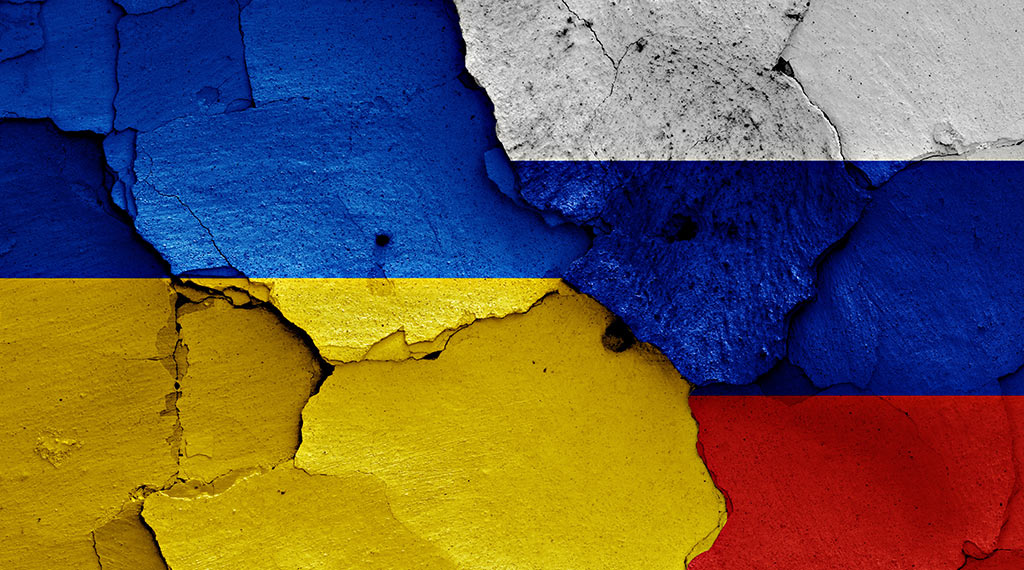Russia/Ukraine fighting highlights divisions in far-left

As Russian forces continue to advance into Ukraine, and Ukrainian forces continue to resist, left-wing radicals are watching the results closely, and developing very different takeaways.
Views largely break down along ideological lines. Many traditional Marxist/Communist parties have effectively endorsed the Russian action, even if giving a head nod to the Marxist notion of “no war but class war.” Some anarchist and “anti-fascist” organizations in the West appeared to have adopted a moderately pro-Ukraine orientation.
Pro-CCP Party for Socialism and Liberation, the driving force behind the prolific anti-war rally organizing coalition known as International A.N.S.W.E.R, issued a statement on their website effectively reiterating Russian claims before noting:
Recognizing that Russia has legitimate security concerns does not require an endorsement of all its military actions, nor Putin’s suggestion that Ukraine has no basis to exist as an independent county, nor his larger geopolitical strategies. The role of the U.S. anti-war movement is not to follow the line of countries in conflict with U.S. imperialism, but to present an independent program of peace and solidarity and anti-imperialism.
The menace of war can only be defeated by international solidarity among the peoples of the world and a resolute struggle against U.S. imperialism, which must demand the abolition of NATO. No war on Russia!
Other PSL statements included a tweet claiming that under socialism Russia and Ukraine coexisted peacefully (no mention being made of the 1932 Holodomor genocide) and called for the abolition of NATO which they describe as “a grave threat to peace around the world.”
The Communist Party of Britain published flyers calling for the expulsion of NATO from British territory. A latter statement criticized with both sides, but then endorsed Russian objectives of a demilitarized and neutral Ukraine.
In a joint letter, Communist parties in 23 countries denounced both sides. It criticized Putin for “the anti-communist rhetoric against Lenin, the Bolsheviks, and the Soviet Union to which the Russian leadership resorts to justify its own strategic plans in the region” but also uncritically accepted Russian provocations of “armed attacks of the Ukrainian government against the people in Donbas.”
Anarchist circles worldwide have traditionally held something of an affinity for Ukraine going back to the 1917-1921 establishment of the Makhnovia or Free Territory and the Revolutionary Insurgent Army of Ukraine which fought both Bolshevik and White Russian forces in the Russian Civil War. Anarchist site Anarchist Black Cross Dresden issued a call to support Ukrainian anarchists with supplies which was broadly echoed.
Antifa support site, CrimethInc, published a report from Ukrainian “anti-authoritarians,” describing a convoluted political scene, which included anarchists serving alongside far-right nationalist forces during the Maidan uprising and seeking training or volunteering with right wing groups during the 2014 conflict. The piece ended up summary:
Anarchists in Ukraine, Belarus, and Russia mostly support Ukrainian independence directly or implicitly. This is because, even with all the national hysteria, corruption, and a large number of Nazis, compared to Russia and the countries controlled by it, Ukraine looks like an island of freedom. This country retains such “unique phenomena” in the post-Soviet region as the replaceability of the president, a parliament that has more than nominal power, and the right to peaceful assembly; in some cases, factoring in additional attention from society, the courts sometimes even function according to their professed protocol. To say that this is preferable to the situation in Russia is not to say anything new. As Bakunin wrote, “We are firmly convinced that the most imperfect republic is a thousand times better than the most enlightened monarchy.”
In the U.S., self-described “anti-fascists” have made statements of support of Ukraine, despite claims by the Russians and others that Ukraine is replete with far-right Nazi groups. Noted Portland Antifa journalist Alissa Azar tweeted “my heart is with you Ukraine, I’m so sorry.”
Minnesota Uprising, an Antifa-aligned twitter account which focuses on activity in Minneapolis highlighted anti-war protests in Russia, and wrote:
There are many parallels between Putin’s war in Ukraine and the West’s imperialist wars abroad. Make no mistake that imperialism in any form is wrong, and that the enemy of my enemy is still my enemy. Solidarity to the Ukrainian people and all people facing imperialism.
Antifa NYC highlighted a video explainer from Antifa Atlanta which concluded with perhaps the quintessential Antifa position, “where are the fascists? The answer is that the fascists are present on multiple sides.”
That said most domestic Antifa groups remain far more exercised about local issues than international ones, and most social media reflected these concerns.
The different reactions among various international and domestic groups show the inherent complexity and division of a post-Cold War far-left. While it is easy for outside observers to seek to lump all left-wing extremists together, as a broad community there are significant and observable fractures and disagreements which become more pronounced during periods of conflict.
- Anarchists call for solidifying gains, expanding violent insurgency - February 5, 2026
- Shideler: Resistance to Immigration Enforcement Is Fierce in Minnesota - February 2, 2026
- The Revolution Is On in Minnesota - January 26, 2026
